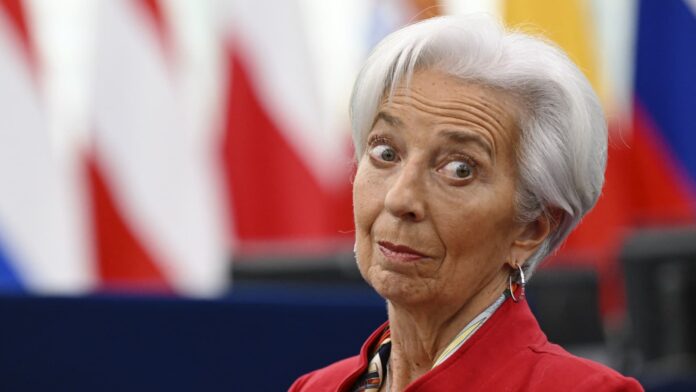European Central Bank (ECB) President Christine Lagarde announces a new monetary policy decision.
Frederick Florin | Afp | Getty Images
The euro traded higher against the U.S. dollar Wednesday, following comments from the European Central Bank President Christine Lagarde that inflation is “still high.”
The euro was up by roughly 0.2% against the U.S. currency around 9 a.m. London time. It reached a five-week high of $1.0795, according to FactSet data.
“A sizeable policy adjustment is already behind us: since July last year we have raised interest rates by 350 basis points. However, inflation is still high, and uncertainty around its path ahead has increased. This makes a robust strategy going forward essential,” Lagarde said in a speech Wednesday.
“But the public can be certain about one thing: we will deliver price stability, and bringing inflation back to 2% over the medium term is non-negotiable,” she added.
The ECB last week decided to raise its interest rates by a further 50 basis points, shrugging off turmoil in the banking sector. The central bank gave no guidance about upcoming rate moves.
Speaking Wednesday, Lagarde noticed a particularly uncertain environment.
“With high uncertainty, it is even more important that the rate path is data-dependent,” she said.
Earlier this month, the ECB projected that headline inflation will come down over the year to reach 5.3% at the end of 2023 and 2.9% in 2024. These figures do not take into account the recent turmoil in the banking sector.
“Those tensions have added new downside risks and have made the risk assessment blurrier. More generally, many of the assumptions in the projections, such as those on fiscal policies and energy and food prices, are volatile. This implies additional uncertainty around the baseline for both growth and inflation,” Lagarde said.
Her comments follow remarks by Joachim Nagel, German central bank chief and ECB member, who noted that the fight against high inflation “is not over”. He told the Financial Times that “price pressures are strong and broad-based across the economy.”
ECB Chief Economist Philip Lane interjected with a more dovish comment, saying Wednesday that there are reasons to believe that underlying inflation measures will ease over time, according to Reuters.



